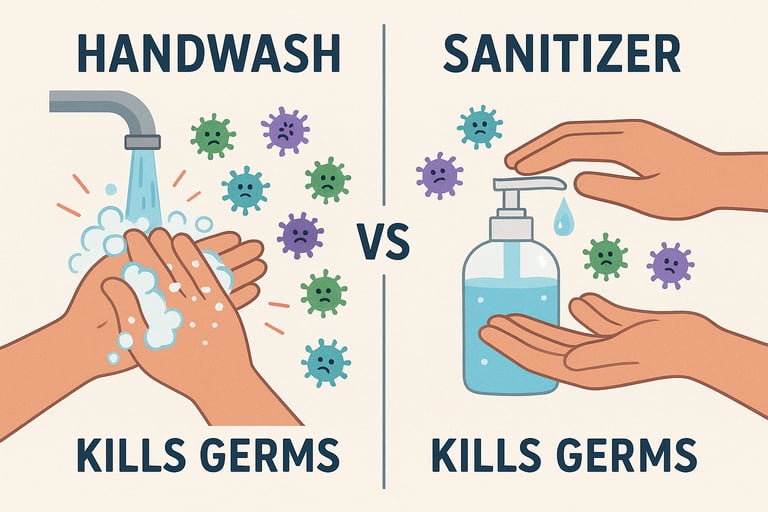Handwash Vs Sanitizer
COMPARISONS


Handwash vs Sanitizer: The Real Story of Cleaner Hands
Neat hands are a quiet kind of flex. We use them for everything — shaking hands, cooking food, touching faces etc, and often forget how easily they pick up germs along the way. Over the last few years, people everywhere around the world have become more thoughtful about hygiene, and today the big question still rises: what’s better, handwash or hand sanitizer? Both are useful, but they aren’t the same. Knowing when to use which can make your hygiene routine far more effective.
Why Handwashing Still Matters?
Washing hands with soap and water has an old-school charm, but it still continues to be one of the most effective methods for maintaining good health. The underlying science is, in fact, very simple yet interesting. Soap molecules feature two ends — one that connects with water and another that clings to oil, fats and dirt. Rubbing your hands together causes those molecules to encircle germs and remove them from the skin Once you rinse everything away with clean water, you’ve physically removed most of the germs.
Doctors and public health experts still call handwashing the “gold standard” of cleanliness because it isn’t just about killing germs; it’s about removing them entirely. And that’s important. For example after gardening, Playing with Pets, or preparing food bacteria hide in oils and dirt. Sanitizer can’t break through that shield, but a good scrub with soap can.
Of course, the simple habits of washing hands with soap, water, and 20 seconds of scrubbing takes time and access to clean water — something thats not always available when you’re out. That’s where sanitizer steps in.
Sanitizers: Modern Convenience with a twist.
Hand sanitizers feel like a modern miracle — quick, portable, and easy to use. When you don’t have access to water, a small bottle of sanitizer can be a real lifesaver. The alcohol in most sanitizers (usually between 60–95%) works differently from soap. Instead of lifting dirt away, alcohol damages the outer layer of certain microbes, effectively disarming them. A quick rub, a few seconds of drying, and you’re done.
But sanitizers have limits. They may not work well on visibly dirty or oily hands because alcohol can’t easily reach the microbes through that layer. They’re also not as effective against certain hardier pathogens like norovirus or bacterial spores. In those cases, soap still wins hands down (literally).
Nevertheless, sanitizers address a significant need. When traveling, dealing with cash, or coming into contact with public surfaces, a quick squirt can truly make an impact. That convenience aspect is the reason sanitizers have turned into common essentials in bags, vehicles, and workplaces worldwide
The Hidden Side of Clean Hands
Interestingly, hygiene experts also talk about the skin’s microbiome, the community of friendly bacteria living on our hands. Overwashing or using too much alcohol-based sanitizer can interupt this natural balance, which sometimes leads to dryness, irritation, or even minor skin cracks. These tiny cracks can ironically make the skin more vulnerable to infection.
To protect your skin while staying clean, choose mild soaps with moisturizing ingredients such as aloe vera, glycerin, or coconut oil. Similarly, pick sanitizers that include soothing elements instead of pure alcohol formulas. And don’t forget to apply a hand cream or moisturizer once a day, especially in colder or drier weather.
Practical Hygiene Tips for Everyday Life
For handwashing:
• Use clean, running water.
• Apply the soap on every areas — palms, back of hands, fingers, and nails.
• Scrub for minimum 20 seconds. A simple trick is to hum a short song while washing.
• Rinse thoroughly and dry with a Clean Towel or Dryer.
For sanitizer use:
• Pick one with at least 60% alcohol.
• Use a coin-sized amount.
• Rub it over your palms, backs, and between your fingers.
• Let it dry naturally — don’t haste it.
These steps sound basic, but consistent practice matters more than anything.
The Bigger Picture
In addition to personal hygiene, maintaining clean hands is also about looking out for others. Each handshake, every meal cooked, every surface contacted leaves behind impressions. Small as they are, germs transmit from one individual to another more readily than we think. This is why consistent hand hygiene is regarded as one of the easiest and most economical methods to decrease disease spread globally.
It’s also a brief daily practice of awareness. The brief moments you take to wash your hands can serve as opportunities to pause, reset, and reflect on your actions — a simple act that accumulates over time.
Final Thoughts
The discussion concerning handwashing and sanitizer isn't truly about which one is superior. It involves utilizing both wisely based on your location and activities. Washing your hands eliminates dirt and bacteria that adhere to your skin, providing a fresh, clean beginning. Sanitizer acts as your backup defender — quick, convenient, and safeguarding when water isn't available.
Ultimately, clean hands rely more on sound judgment than on adhering to rigid guidelines. Soap and sanitizer are resources — readily accessible, inexpensive, and possibly life-saving. Utilize them wisely, utilize them frequently, and you’ll be engaging in one of the easiest yet most impactful actions for your well-being.

